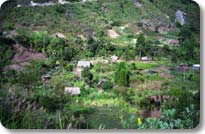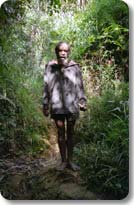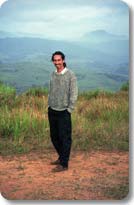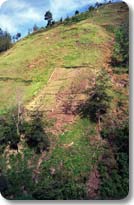Apinun:
Is how you say "good afternoon" in Papua-New Guinean Pidgin.
I arrived in the afternoon and was greeted warmly by a
country
and that welcome wouldn't end.
 Clouds
covered the
landscape as the flight approached Mt. Hagen and it was only just
before landing that one could see the ground, studded with thatched
huts. Quite a world away from leaving Australia two hours
before. Customs was suitably low key and low tech and I was
picked up by Haus Poroman lodge. They put me in a very large,
luxurious room. I indicated that I was in the dorm and they
put me in the largest, most luxurious dorm ever seen.
Clouds
covered the
landscape as the flight approached Mt. Hagen and it was only just
before landing that one could see the ground, studded with thatched
huts. Quite a world away from leaving Australia two hours
before. Customs was suitably low key and low tech and I was
picked up by Haus Poroman lodge. They put me in a very large,
luxurious room. I indicated that I was in the dorm and they
put me in the largest, most luxurious dorm ever seen.
I wandered back to Mt. Hagen spending some time at the
market. Lots of foods that I had not seen before.
People paid a lot of attention to me as there no other foreigners, but
all in all were quite friendly. The town resembled some of
the towns in Fiji. It was a bit chaotic but that's to be
expected. Back at Haus Poroman, I met an employee.
He told me he had three names. First was his baptismal name,
Francis. Then he had a tribal name, Gwon, but that was only
used in the village. Finally he had an English name, Jack,
that I was to use.
He told me that a few years back, his village had been involved in
tribal warfare in a land dispute. His tribe was biding their
time, awaiting the moment to strike to take back the land.
Somehow, I think the other tribe would tell the same story.
His wontoks (=one talk=fellow villagers) were nearly wiped out by the
opposing tribe a hundred years ago, down to a few members.
They've built their numbers up to 1200 people but the other group was
now at 15,000 people, so Jack's tribe is waiting. They will
point to the other side of the valley and say to their children,
"That's your land over there. Someday it will be
yours." He really didn't like the conflict and hoped the war
was over but didn't seem confident that that would be the
case.
He was a very interesting and engaging person and somehow the subject
of professional wrestling came up. He said, "Goldberg (a
wrestler) is my man!" I mentioned it was fake, which he
didn't believe. "Jack, look how they get pounded yet never
get a bruise." Eventually he started to be convinced but
said, "I don't care, Goldberg is still my man!"
 I spent a few days in
the area and went to see a waterfall Jack had
mentioned. It was a rugged and rutted trail and partway
there, I encountered a group of homes. A man wanted to guide
me there for 3 Kina (1K=.40 US cents), yet only had 1.5K on me but he
accepted it. He was twice my age but an absolute mountain
goat. Fast and nothing stopped him. Encountering
such strong people would be a common experience in PNG. These
people are made of iron. On the return trip, he walked off
and left me to fend for myself. I guess that's what you get
only paying half the guiding fee. I encountered a group of
children who demanded, "Kina! Kina!" I said no and
one kid started slapping me and the rest threw dirtballs at
me. There is only one appropriate response: Throw
them back.
I spent a few days in
the area and went to see a waterfall Jack had
mentioned. It was a rugged and rutted trail and partway
there, I encountered a group of homes. A man wanted to guide
me there for 3 Kina (1K=.40 US cents), yet only had 1.5K on me but he
accepted it. He was twice my age but an absolute mountain
goat. Fast and nothing stopped him. Encountering
such strong people would be a common experience in PNG. These
people are made of iron. On the return trip, he walked off
and left me to fend for myself. I guess that's what you get
only paying half the guiding fee. I encountered a group of
children who demanded, "Kina! Kina!" I said no and
one kid started slapping me and the rest threw dirtballs at
me. There is only one appropriate response: Throw
them back.
That evening Jack showed me a video called First Contact. The
highlands of PNG were "terra incognita", unknown lands, in the
30's. It turns out that the Waghi Valley was the most densely
populated part of the country and was "discovered" by prospectors who
went there in the 1930's and found people living in the stone
age. In traditional lore, their ancestors were pale and would
come from the east and when the pale-skinned miners came from the east,
they were often taken for supernatural beings. They brought a
movie camera and documented these amazing first contacts about two
worlds who really didn't know anything about each other.
There were numerous first contacts that continued into the 1960's and
beyond. Someone told me about a first contact in 1998 in the
more remote parts of the country. I would later meet people
who told me of the day the "white man" first came to their
village. Too wild.
 After the film, Jack
brought me to the top of a ridge. He
pointed down at the Waghi Valley, the largest in PNG, and said, "This
is where a lot of First Contact occurred. It wasn't so long
ago that things were very different. Mt. Hagen has grown in
unbelievable ways. We've gone from the stone age to the
information age in lifetime." He told me more of how PNG is
in the grips of dealing with a changing world, something I would become
aware of in the coming months. He knew of one guy in the film
who still lived in town. Talk about having your world turned
upside down.
After the film, Jack
brought me to the top of a ridge. He
pointed down at the Waghi Valley, the largest in PNG, and said, "This
is where a lot of First Contact occurred. It wasn't so long
ago that things were very different. Mt. Hagen has grown in
unbelievable ways. We've gone from the stone age to the
information age in lifetime." He told me more of how PNG is
in the grips of dealing with a changing world, something I would become
aware of in the coming months. He knew of one guy in the film
who still lived in town. Talk about having your world turned
upside down.
Every place has to deal with change but for many in PNG, that change in
an order of magnitude greater. It will still be a poor,
agrarian country for years to come but that leap out of the stone age
for large parts of the country must be wrenching. Granted
that most of the remote parts of the country will experience little
change and people will continue to live in their villages but dealing
with the modern world in such a rapid fashion is something that I would
learn is one of the big issues facing the country.
 I spent a few days in Mt. Hagen to get a feel for things and to
acclimate and would be heading off to Mt. Wilhelm next. One
thing I quickly became aware of was the security problem. I
was told to be back to the lodge before dark and always be aware of
shady characters. Even ordinary shops might have several guys
with construction helmets sitting by the door. At first this
didn't make sense until I figured out that security guards there wear
such headgear. The number of buildings with razor wire and
bars on them was unlike anything I've seen before. In western
terms, "rascal" is a term of endearment, but in PNG, rascals are thugs
and are the bane of the country. It's such a shame as the
average person is quite welcoming.
I spent a few days in Mt. Hagen to get a feel for things and to
acclimate and would be heading off to Mt. Wilhelm next. One
thing I quickly became aware of was the security problem. I
was told to be back to the lodge before dark and always be aware of
shady characters. Even ordinary shops might have several guys
with construction helmets sitting by the door. At first this
didn't make sense until I figured out that security guards there wear
such headgear. The number of buildings with razor wire and
bars on them was unlike anything I've seen before. In western
terms, "rascal" is a term of endearment, but in PNG, rascals are thugs
and are the bane of the country. It's such a shame as the
average person is quite welcoming.
When my the bill was presented, it was 4x the expected
amount. That luxurious dorm wasn't a dorm, it was a private
room with three beds. The person who checked me in didn't
understand "dorm." It was a long and arduous process that
took the next two weeks to settle and I paid by credit card so that if
I needed to file a dispute I could. Jack brought me into town
to get a PMV (Public Motor Vehicle, usually a small bus or minivan) and
I said goodbye.
The route was
surrounded by steep green valleys everywhere, which is a
trademark of the highlands. It's a beautiful countryside for
sure. In some countries, to farm on steep hillsides terraces
are built, here they just go plant straight away. Jack told
me that there are places so steep where people use ropes so that they
can till their fields. The gardens are broken up into square,
mound-like parcels about 1-2 meters square. I would see a
similar style all across the country. PNG developed
agriculture 10,000 years ago, one of the first places in the world, and
the current farming techniques are still heavily influenced by the past.
It was a pleasant ride and the people on the bus seemed to like my
company and vice-versa. I stopped in Kundiawa to catch a PMV
to Kegsugl which would lead to Mt. Wilhelm. You know, I was
really liking this country.
 Clouds
covered the
landscape as the flight approached Mt. Hagen and it was only just
before landing that one could see the ground, studded with thatched
huts. Quite a world away from leaving Australia two hours
before. Customs was suitably low key and low tech and I was
picked up by Haus Poroman lodge. They put me in a very large,
luxurious room. I indicated that I was in the dorm and they
put me in the largest, most luxurious dorm ever seen.
Clouds
covered the
landscape as the flight approached Mt. Hagen and it was only just
before landing that one could see the ground, studded with thatched
huts. Quite a world away from leaving Australia two hours
before. Customs was suitably low key and low tech and I was
picked up by Haus Poroman lodge. They put me in a very large,
luxurious room. I indicated that I was in the dorm and they
put me in the largest, most luxurious dorm ever seen. I spent a few days in
the area and went to see a waterfall Jack had
mentioned. It was a rugged and rutted trail and partway
there, I encountered a group of homes. A man wanted to guide
me there for 3 Kina (1K=.40 US cents), yet only had 1.5K on me but he
accepted it. He was twice my age but an absolute mountain
goat. Fast and nothing stopped him. Encountering
such strong people would be a common experience in PNG. These
people are made of iron. On the return trip, he walked off
and left me to fend for myself. I guess that's what you get
only paying half the guiding fee. I encountered a group of
children who demanded, "Kina! Kina!" I said no and
one kid started slapping me and the rest threw dirtballs at
me. There is only one appropriate response: Throw
them back.
I spent a few days in
the area and went to see a waterfall Jack had
mentioned. It was a rugged and rutted trail and partway
there, I encountered a group of homes. A man wanted to guide
me there for 3 Kina (1K=.40 US cents), yet only had 1.5K on me but he
accepted it. He was twice my age but an absolute mountain
goat. Fast and nothing stopped him. Encountering
such strong people would be a common experience in PNG. These
people are made of iron. On the return trip, he walked off
and left me to fend for myself. I guess that's what you get
only paying half the guiding fee. I encountered a group of
children who demanded, "Kina! Kina!" I said no and
one kid started slapping me and the rest threw dirtballs at
me. There is only one appropriate response: Throw
them back. After the film, Jack
brought me to the top of a ridge. He
pointed down at the Waghi Valley, the largest in PNG, and said, "This
is where a lot of First Contact occurred. It wasn't so long
ago that things were very different. Mt. Hagen has grown in
unbelievable ways. We've gone from the stone age to the
information age in lifetime." He told me more of how PNG is
in the grips of dealing with a changing world, something I would become
aware of in the coming months. He knew of one guy in the film
who still lived in town. Talk about having your world turned
upside down.
After the film, Jack
brought me to the top of a ridge. He
pointed down at the Waghi Valley, the largest in PNG, and said, "This
is where a lot of First Contact occurred. It wasn't so long
ago that things were very different. Mt. Hagen has grown in
unbelievable ways. We've gone from the stone age to the
information age in lifetime." He told me more of how PNG is
in the grips of dealing with a changing world, something I would become
aware of in the coming months. He knew of one guy in the film
who still lived in town. Talk about having your world turned
upside down.  I spent a few days in Mt. Hagen to get a feel for things and to
acclimate and would be heading off to Mt. Wilhelm next. One
thing I quickly became aware of was the security problem. I
was told to be back to the lodge before dark and always be aware of
shady characters. Even ordinary shops might have several guys
with construction helmets sitting by the door. At first this
didn't make sense until I figured out that security guards there wear
such headgear. The number of buildings with razor wire and
bars on them was unlike anything I've seen before. In western
terms, "rascal" is a term of endearment, but in PNG, rascals are thugs
and are the bane of the country. It's such a shame as the
average person is quite welcoming.
I spent a few days in Mt. Hagen to get a feel for things and to
acclimate and would be heading off to Mt. Wilhelm next. One
thing I quickly became aware of was the security problem. I
was told to be back to the lodge before dark and always be aware of
shady characters. Even ordinary shops might have several guys
with construction helmets sitting by the door. At first this
didn't make sense until I figured out that security guards there wear
such headgear. The number of buildings with razor wire and
bars on them was unlike anything I've seen before. In western
terms, "rascal" is a term of endearment, but in PNG, rascals are thugs
and are the bane of the country. It's such a shame as the
average person is quite welcoming.